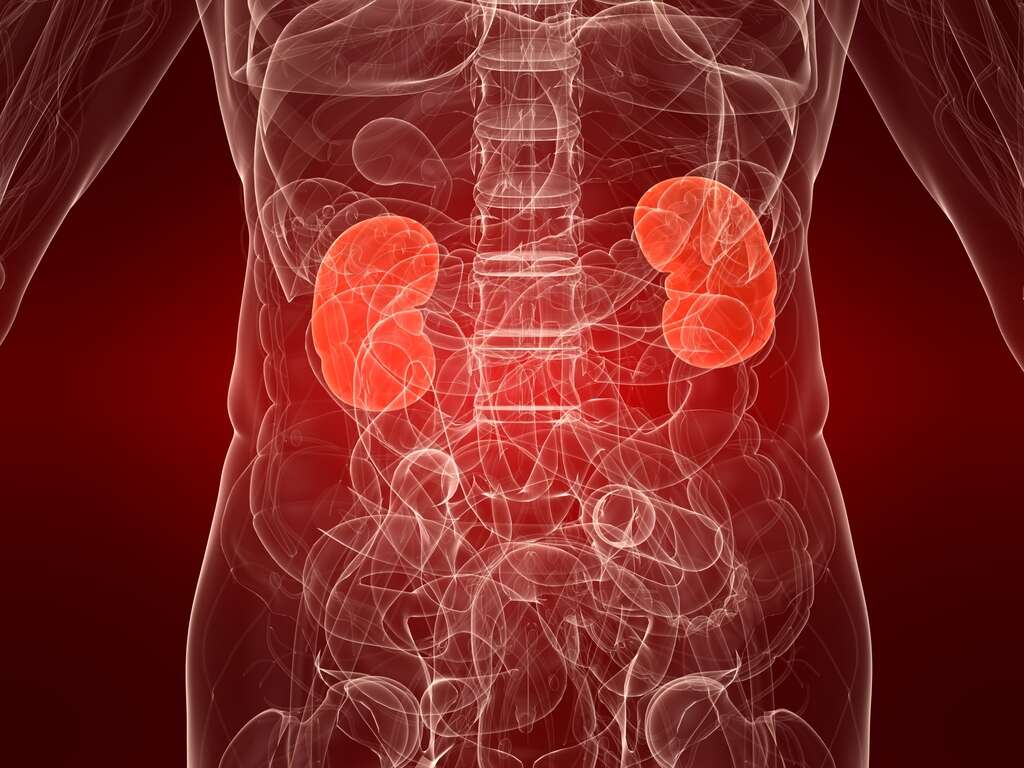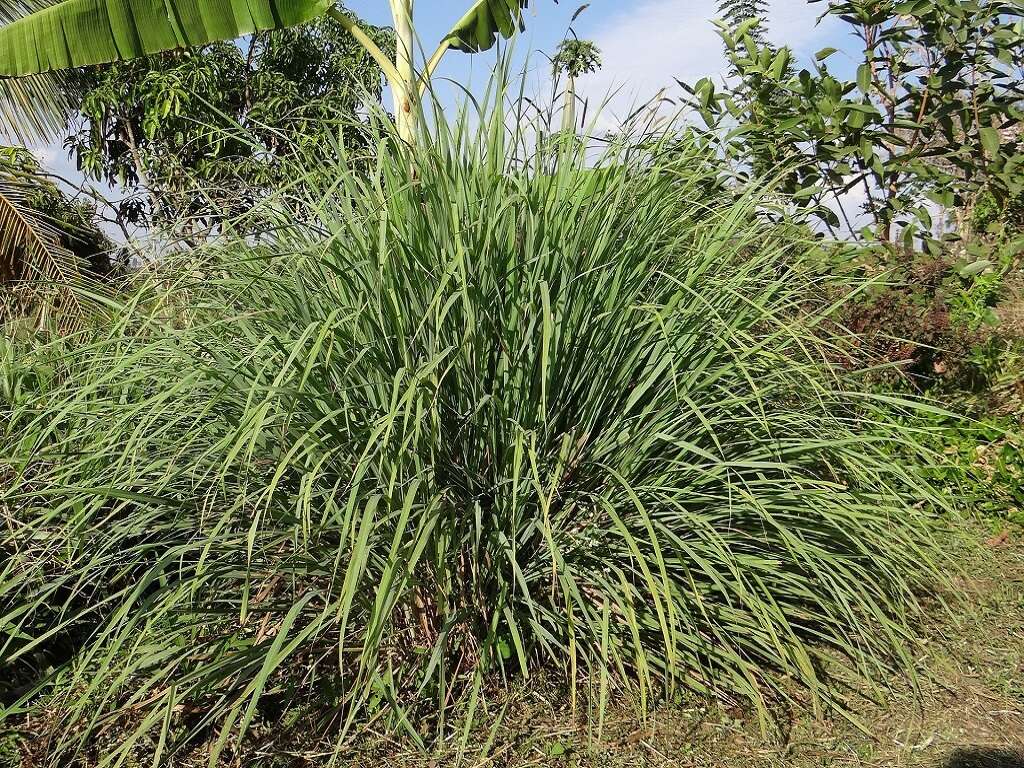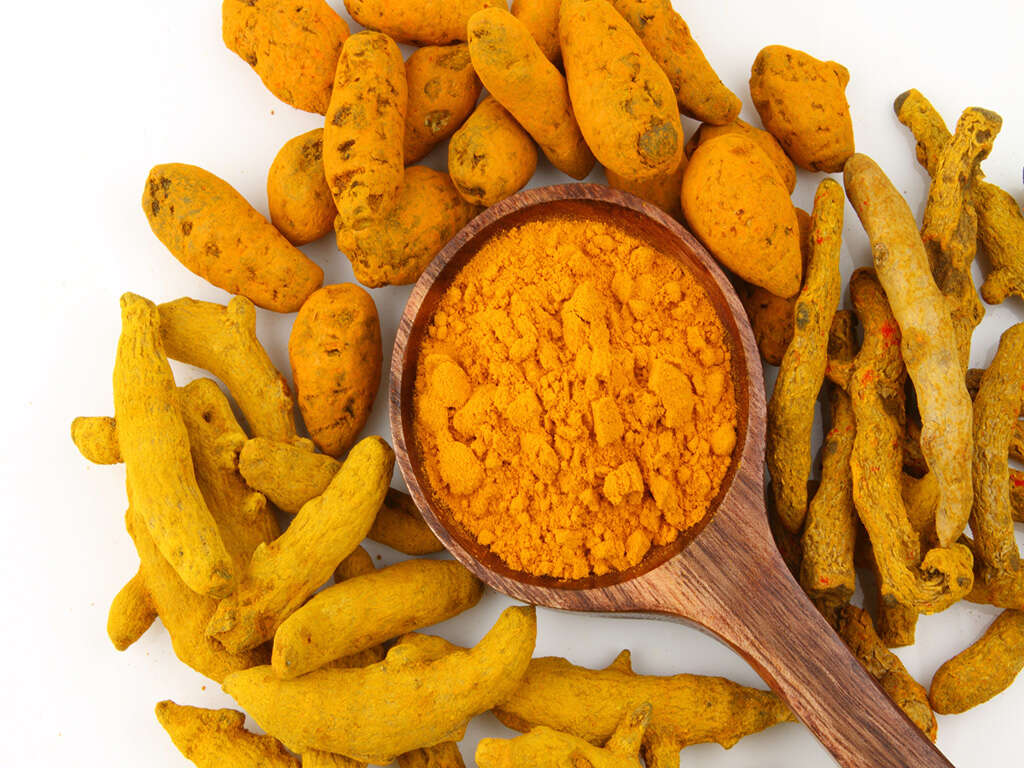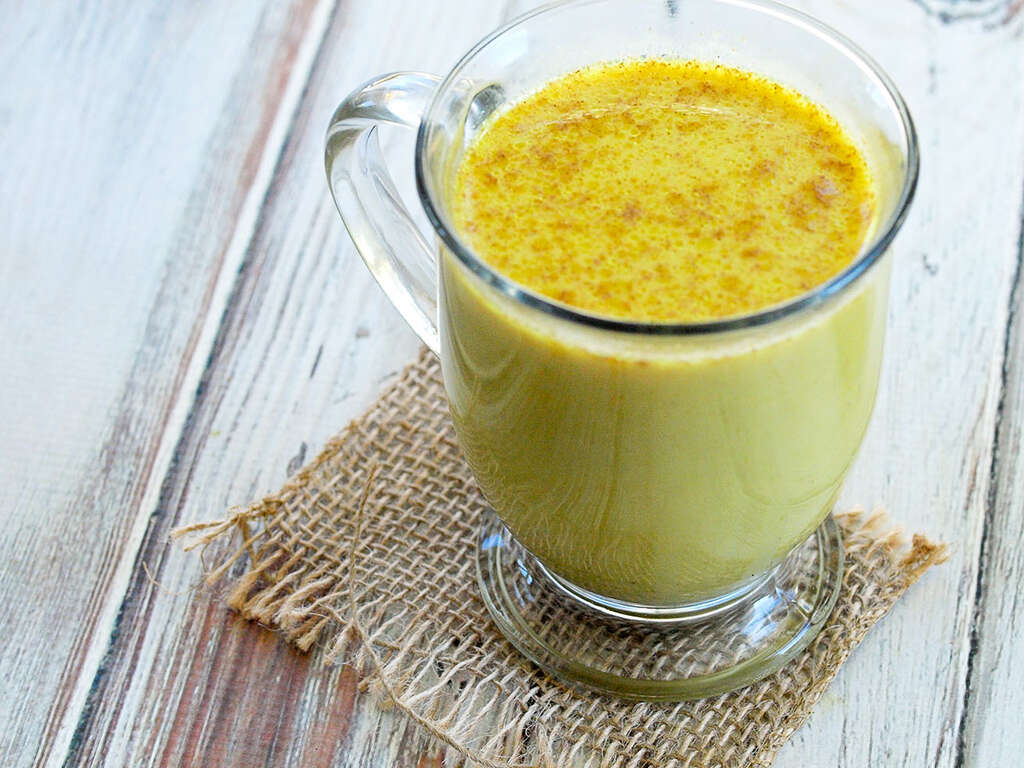Turmeric: 10 Benefits of Turmeric
Turmeric is the main ingredient in curry powder and is a staple ingredient used in Indian and Asian cuisine. Traditionally referred to as the “Indian Saffron,” it provides a unique flavor and vibrant golden color. Turmeric is often used in savory dishes and is sold in its fresh form as well as a powdered form. Nutritionally, turmeric is a great source of iron, fiber and vitamin C. In addition to its wide culinary uses and nutrient density, turmeric has also long been used in Ayurvedic medicine. Its use in treating ailments such as respiratory illnesses and skin conditions can be traced back to as far as 500 B.C.
Due to its anti-inflammatory, anti-microbial and anti-oxidative abilities, turmeric is considered to act as a protective agent. Today, turmeric is often used as a dietary supplement, and recently has become a popular ingredient in smoothies and coffee drinks. Although research remains inconclusive, curcumin, the active ingredient in turmeric is thought to be responsible for turmeric’s powerful medicinal properties. While there have been several health claims made about the benefits, the amount of curcumin in turmeric is relatively low. However, current research is showing the use of a concentrated curcumin along with black pepper for increased absorption is the way to see the real benefits.
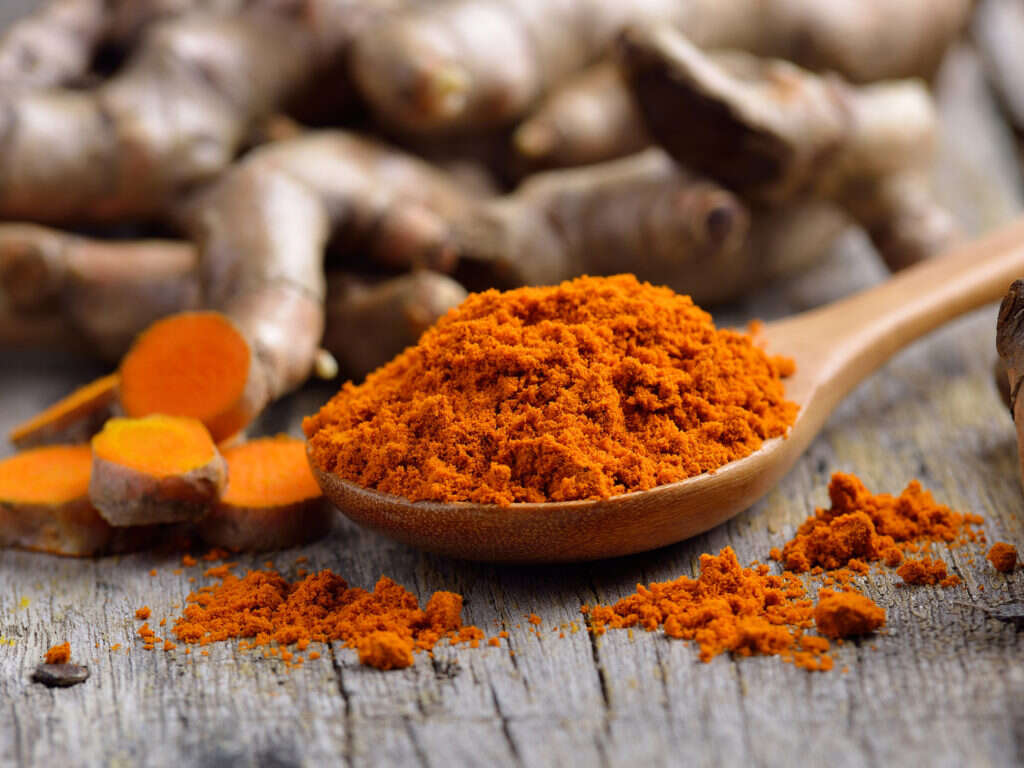
Turmeric Benefit #1: Heart Protective
Cardiovascular disease is the number one cause of death in the United States. There are many studies showing turmeric or more importantly, curcumin and its powerful effect on heart health. In fact, curcumin seems to play a role in preventing several processes that can eventually lead to heart disease by acting as an anti-inflammatory and anti-oxidant. It has even been suggested that the use of curcumin could be just as effective as the use of a statin drug.
Curcumin is cardio-protective and acts by reducing inflammatory mediators in the cardiac tissues. A recent study conducted in 2017 evaluated whether the use of turmeric and curcumin played a role in reducing the lipid levels. Over 600 patients included in the meta-analysis showed a significant reduction in LDL and triglyceride levels with turmeric supplementation. Additionally, a randomized clinical trial showed that supplementation of curcumin before and after a coronary bypass surgery reduced the incidence of myocardial infarction post surgery.

Turmeric Benefit #2: Cancer
Turmeric has long been known as a powerful antioxidant that aims to reduce free radicals in the system. It is worthy of noting that South East Asia the biggest users of turmeric also have the lowest incidence of cancers. Whether simply a coincidence or the two are correlated is a topic of debate, however the use of turmeric in the treatment of cancer is commonly used as a holistic approach in conjunction with cancer treatment. It has been shown to play a role in reducing tumor size and/or inhibiting tumor growth with specific reports of its effectiveness against breast cancer, leukemia, lymphoma, and gastrointestinal cancers among many others.
Curcumin can be effective in suppressing the many phases of cancer development. New research is showing that turmeric may have an affinity for cancer cells. There are several theories that explain turmeric’s predisposition for cancer cells. Lower glutathione levels in cancer cells increases their sensitivity to curcumin and leads to a higher cellular uptake. Even more, curcumin can reduce the toxicity levels of chemotherapeutic drugs such as Cisplatin and Methotrexate that often lead to inflammation and oxidative stress and increase the effectiveness of radiation therapy.

Turmeric Benefit #3: Gut Health
Inflammatory bowel disease (IBD) including Crohn’s disease and ulcerative colitis are characterized by inflammation of the gastrointestinal tract. Although not life threatening, IBD affects quality of life and increases the risk of developing colorectal cancer. Curcumin can improve symptoms by decreasing the inflammatory response of immune-mediated diseases such as Crohn’s and ulcerative colitis.
Studies show that patients showed a lower Crohn’s Disease Activity Index scores that indicate the severity of the inflammatory response. Curcumin increases the secretion of digestive enzymes and helps prevent and treat IBD. Even more, studies show that it can maintain remission of ulcerative colitis flare-ups when curcumin was prepared as an enema.

Turmeric Benefit #4: Arthritis
Arthritis is a chronic and acute condition that is largely associated with inflammation. Osteoarthritis is said to affect over 250 million people worldwide and is characterized by elevated cytokines and systemic inflammation. Curcumin has been shown to have an anti-arthritic effect with a significant decrease in pain symptoms. A substantial decrease in all inflammation markers was seen in a higher dose of curcumin (approximately 1000 mg per day).
Additionally, curcumin provides a two-fold benefit in the treatment of osteoarthritis. Ibuprofen is frequently used in combination with other pain management treatments in treating osteoarthritis. A common side effect of using ibuprofen or other NSAIDS is gastrointestinal symptoms often characterized by an upset stomach. Curcumin replaces the need for daily NSAID by reducing pain symptoms often associated with osteoarthritis.

Turmeric Benefit #5: Depression
Curcumin has also been associated with improving symptoms of major depressive disorder. It is well known that many regulated pathways gone awry are associated with depression. By acting as an anti-inflammatory, curcumin supplementation targets several of the malfunctioning pathways.
Decreased levels of serotonin and dopamine or the “happy” chemicals are associated with major depressive disorder symptoms. A hormone called brain-derived neurotropic factor (BDNF) is decreased in brain disorders and illnesses. Additionally, it is known to assist in serotonin and dopamine production. Studies have shown that curcumin can boost BDNF that then increases serotonin and dopamine production thus improving mood-related symptoms.

Turmeric Benefit #6: Brain Benefits
Curcumin also acts as a neuro-protective agent by assisting in the prevention of changes in cell proteins that are often associated with the ageing process. Research is showing that curcumin may be effective for preventing neurodegenerative diseases such as Alzheimer’s, Parkinson’s disease and multiple sclerosis.
Alzheimer’s disease is characterized by abnormal protein development, inflammation and oxidative injury. Curcumin has shown to help clear the protein buildup and act as an antioxidant and anti-inflammatory agent. It also acts as an antioxidant by protecting the loss of neurons, one of the main processes that occur in the development of Parkinson’s disease. In multiple sclerosis, curcumin appears to regulate and inhibit inflammatory cytokines, a marker in autoimmune diseases.

Turmeric Benefit #7: Skin
The use of curcumin in skin conditions dates back to ancient times and is often added in skin screams and soaps. Traditionally it is often used to treat eye infections, burns and acne. With emerging research that shows it also may be effective in skin conditions such as dermatitis, psoriasis and vitiligo. Specifically in India, curcumin is used in the treatment of itchy skin.
Psoriasis is a skin condition that is characterized with hyper-proliferation and abnormal function of skin cells. The use of curcumin appears to improve psoriasis by attacking the free radicals and reducing inflammation through inhibition of the inflammatory cytokines. Additionally vitiligo, a chronic skin condition characterized by loss of pigmentation, has been known to improve with topical use of a curcumin cream in conjunction with narrow band UVB therapy.

Turmeric Benefit #8: Allergy & Asthma
Turmeric for the treatment of asthma and allergies dates back to ancient times. Pro-inflammatory diseases such as allergies and asthma also stem from inflammatory cytokines. Allergies are an immune response that occurs during an inflammatory state, which triggers the release of histamines produced by mast cells. Curcumin has shown to suppress 48 of the 80 induced histamines.
In the treatment of asthma, curcumin has shown to decrease asthmatic symptoms by broadening the narrowed air pathway and increasing the antioxidant capacity. Additionally it acts against inflammatory agents by decreasing the production of IgE antibodies, which cause the release of histamines in the mast cells thus inhibiting the inflammatory response.
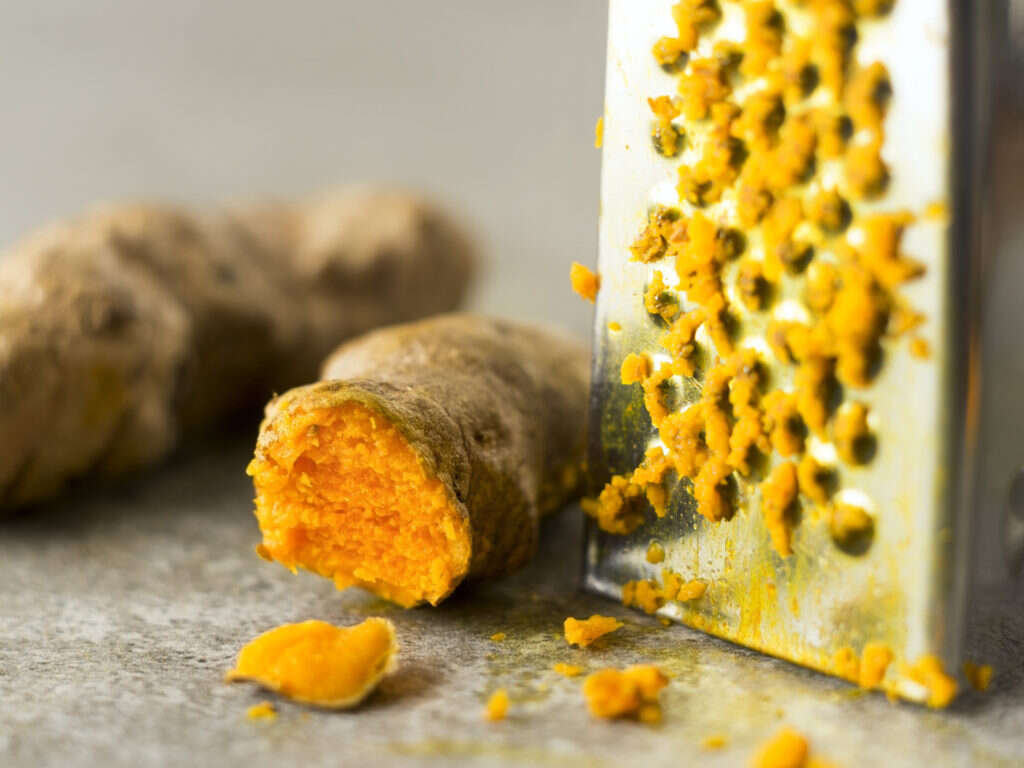
Turmeric Benefit #9: Diabetes Mellitus
Diabetes is a chronic disease that is a growing concern in the United States and often leads to kidney, brain, heart and liver problems. Type II diabetes is primarily caused by hyperglycemia that eventually leads to an inflammatory response by cytokines, transcription factors and enzymes. This inflammatory response plays a large role in the progression of the disease. Using turmeric powder or curcumin extract has shown a decrease in fasting blood sugars.
Curcumin has also shown to assist in suppressing this inflammatory response by decreasing glucose production in the liver and increasing glucose intake of the cells. Furthermore, curcumin has also been shown to improve obesity, which is known to increase the risk of developing type II diabetes. Studies have shown that curcumin can suppress the extracellular signals in the fat cells, a process that is closely associated to obesity. It has even shown to decreased symptoms of anxiety and depression associated with obesity.

Turmeric Benefit #10: Chronic Kidney Disease
Inflammation and oxidative stress increase the risk of cardiovascular complications and death in patients with chronic kidney disease (CKD). There are several studies showing curcumin’s anti-bacterial, anti-viral, anti-inflammatory and anti-oxidative abilities provide protection to the kidneys. By inhibiting and suppressing the inflammatory markers in the blood, curcumin can be as effective as fish oil supplementation.
Although still in its experimental phase, due to its ability to decrease the inflammatory cytokines and reduce oxidative stress by attacking free radicals in the system, curcumin appears to be a promising addition in the treatment of kidney disease. Curumin reduces toxins that accumulate in the kidney, lowers the blood urea nitrogen and creatinine levels, decreases renal vascular resistance and improves glomerular filtration rate and renal blood flow.
